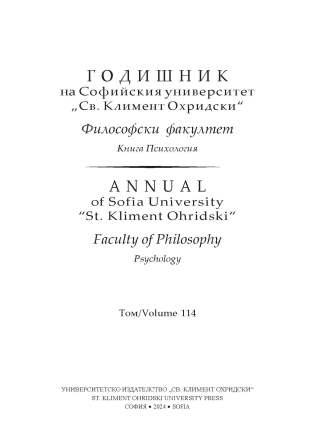Постнаталната депресия и комплексът на „мъртвата“ майка
Postnatal depression and the complex of the “dead” mother
Author(s): Rumyana Krumova-PeshevaSubject(s): Social Sciences, Psychology, Clinical psychology, Psychoanalysis
Published by: Софийски университет »Св. Климент Охридски«
Keywords: postnatal depression; protracted depression; Andre Green; psychotherapy
Summary/Abstract: Postnatal depression is a condition that chronically threatens the mother's mental functioning. It can be provoked by a variety of causes, both conscious and unconscious. Some of these causes are related to an intense affective reaction to the mental and physical separation of mother and child after childbirth, increased anxiety and tension during pregnancy, various fears and apprehensions about the act of childbirth, etc. Researchers look for etiological elements in difficulties in the process of coping with the parental role, in some dysfunctional relationships in the family and especially in the couple, and in the presence of some kind of negative life events. The prolongation of postnatal depressive distress may be triggered by a failure to recognize such an experience or, in some cases, by minimizing it. Maternal depression is also likely to cause severe psychological distress in the child. Later in adult life, it may lead to symptoms that are not specifically depressive in nature, but rather associated with frustration, helplessness, indecisiveness, increased interpersonal conflict, deviant behavior, asocial and antisocial tendencies, etc. The aim of this paper is to present some of the psychiatric issues in cases of women with postpartum depressive states. Increased depressiveness is expressed by a number of mechanisms of transformation into symptoms at the somatic level. These are functional and, in some cases, organic in nature. Different psychosomatic equivalents of depression develop, with a markedly paradoxical character. André Green's metaphor of the "dead" mother figure, in turn, allows us to interpret, understand and explain a range of psychopathological consequences and dimensions of suffering in the children of women with severe and prolonged postnatal depression.
Journal: Годишник на Софийски университет „Св. Климент Охридски“. Философски факултет. Психология
- Issue Year: 114/2024
- Issue No: 1
- Page Range: 202-222
- Page Count: 20
- Language: Bulgarian

